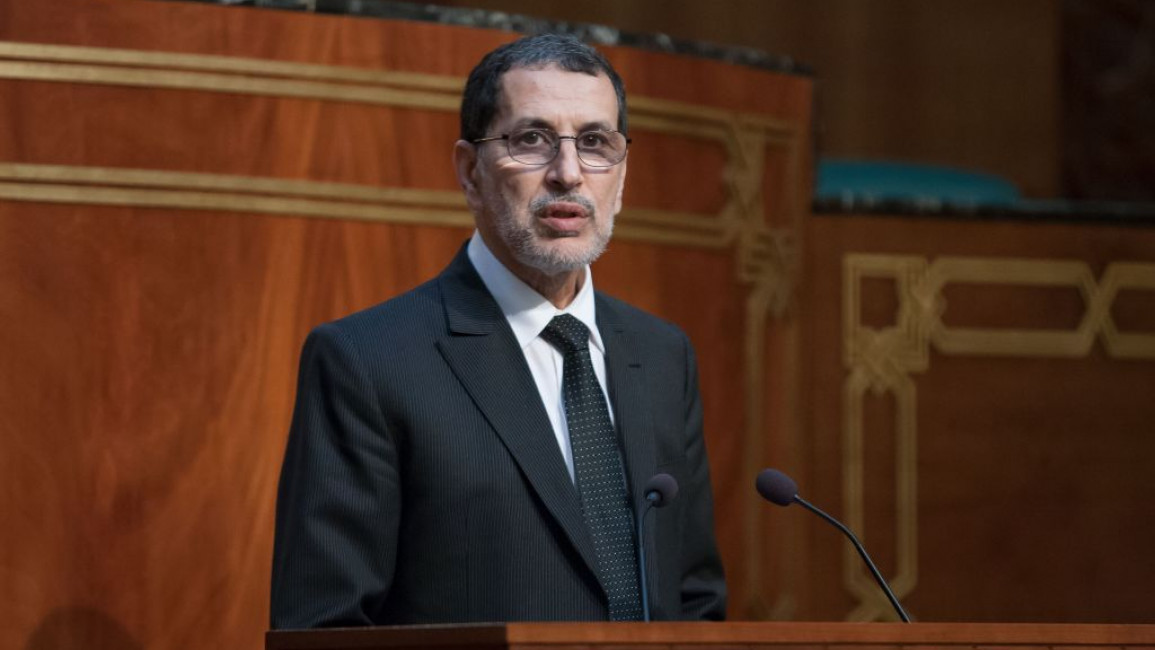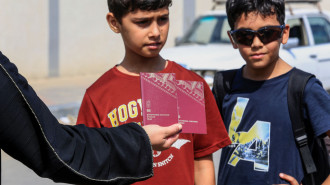Former Moroccan PM who signed Israel normalisation deal meets Hamas leaders amid Gaza war
One of Morocco's key signatories of the normalisation deal with Israel, former prime minister Saad Eddine El-Othmani, recently met with Hamas leadership to demonstrate support amid Israel's war on Gaza. His meeting stirred controversy on both sides of Morocco's political divide.
Last week, during a visit to Doha, Morocco's former prime minister (2016-2021) El-Othmani met with Ismael Haniya, chairman of Hamas' political bureau, Khaled Mashal, former head of the Islamist group, and Mousa Abu Marzook, a senior member of Hamas.
"I personally highlighted Morocco's efforts under the leadership of His Majesty King Mohammed VI in supporting Palestinians in Jerusalem and Gaza. (...) I noted the Moroccan people's response to condemn the aggression," wrote Othmani on 9 May on X, the social media platform formerly Twitter.
سعدت أثناء مقامي في الدوحة بزيارة الأستاذ #إسماعيل_هنية رئيس المكتب السياسي ومعه بعض قيادات حركة #حماس: خالد مشعل وموسى أبو مرزوق بالخصوص. كانت فرصة لأجدد التعزية والترحم على شهداء غزة، والشهداء من أسر القيادات الحاضرة بالخصوص. تقبل الله الجميع عنده وعوض الأحياء خيرا.
— سعد الدين العثماني EL OTMANI Saad dine (@Elotmanisaad) May 9, 2024
وقد استمعت… pic.twitter.com/qvJimOYu3j
Late in 2020, Rabat normalised ties with Tel Aviv under the leadership of Saad Eddine El-Othmani, who was prime minister and head of the Justice and Development Party (PJD) at the time.
After leaving office, El-Othmani claimed he was under pressure and that his long-standing anti-normalisation position has never changed.
"That moment [signing the normalisation deal] was painful and difficult. But it was a decision of a state, and I was head of government," he said in an interview with Al-Araby TV in 2022.
El-Othmani's move to sign the normalisation divided the party and further angered PJD's supporters after a decade of economic and political chaos, leading to their significant loss during the September 2021 elections.
PJD and Palestine: a true support or political campaign?
The party re-elected its former controversial leader, Abdelilah Benkirane, as the new secretary-general. Benkirane has since admitted that "normalisation was a mistake."
Benkirane's strong-worded statements against the "Moroccan diplomacy's pro-Israeli bias" led to an unprecedented political brawl between the Islamist opposition and the royal palace.
Last March, the royal cabinet accused the PJD of "instrumentalising" the Palestinian cause and giving in to "political one-upmanship and narrow electoral campaigns." The PJD denied these accusations.
Yet, after Othmani's recent meeting with Hamas leadership, several Moroccan social media users echoed similar accusations against the PJD and its back-and-forth policy vis-à-vis the Palestinian cause.
Several users commented on the former Moroccan official's post, embedding his picture with senior advisor Jared Kushner and Israel's National Security Advisor Meir Ben-Shabbat taking during the normalisation signature ceremony, and accused him of 'betrayal of the cause' and labelling him a 'supporter of normalisation.'
On the other hand, other social media users condemned the former official's meeting with Hamas leadership as a deviation from Morocco's diplomacy that maintains no official ties with the Iran-backed movement. Rabat and Tehran have maintained stirred ties for years, mainly over Iran's alleged training of Polisario Front members in the disputed territory of Western Sahara, which Morocco considers its own.
Rabat's efforts amid anti-normalisation protests
It remains unclear if El-Othmani's visit to Doha was prompted by official instructions amid Rabat's endeavour to ease the country's growing anti-normalisation rallies.
Last November, former Hamas leader Khaled Meshaal called on Moroccans to pressure King Mohammed VI to end his country's normalisation deal with Israel over its war on Gaza.
On 4 May, Morocco's King Mohammed VI attributed, for the first time, "the escalating situation in the Palestinian territories to Israel."
"This tense situation is exacerbated by a resurgence of systematic attacks by extremist settlers in the West Bank, instigated by Israeli government officials," stated the monarch in his speech at the Summit Conference of the Organization of Islamic Cooperation.
Although Israel's war on Gaza may have slowed the pace of normalisation with Tel Aviv, analysts predict that Morocco is unlikely to sever ties with Israel.
In March, Rabat reaffirmed its ongoing normalisation with Israel, arguing its benefits for the Palestinian people, such as securing aid.
Nonetheless, local anti-normalisation activists are determined to pressure Rabat to reverse normalisation, as in the early 2000s during the second Intifada.




 Follow the Middle East's top stories in English at The New Arab on Google News
Follow the Middle East's top stories in English at The New Arab on Google News
![People gathered around the rubble of destroyed houses to search for survivors [Getty]](/sites/default/files/styles/image_330x185/public/2024-11/GettyImages-2184733820.jpg?h=199d8c1f&itok=NiM1LO2f)

